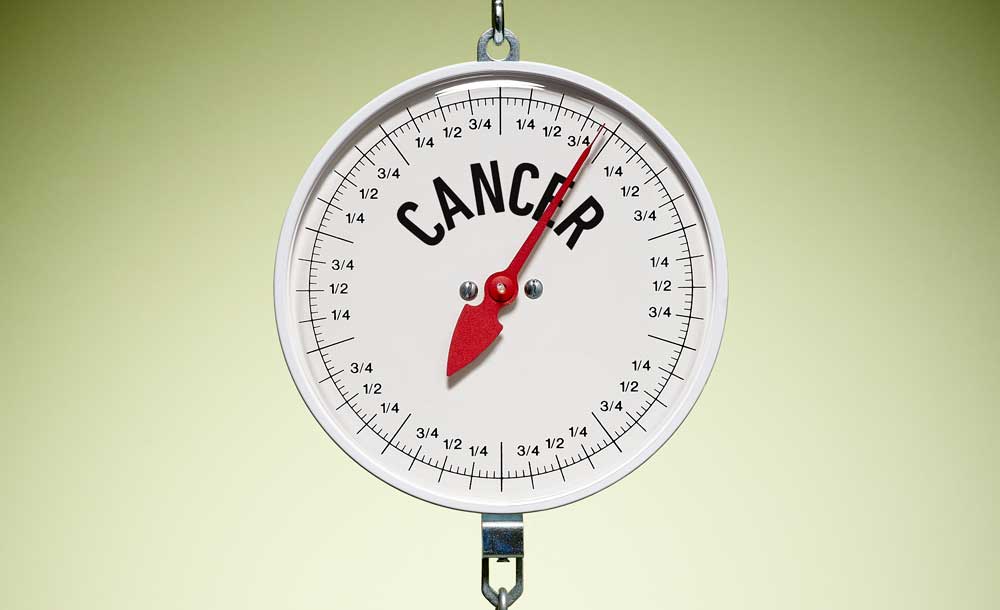
Can Your Weight Affect Your Risk of Getting Cancer?
-
Weight-loss treatment may help
If you’re carrying excess weight, those extra pounds can affect many areas of your health, including your risk for cancer.
In fact, being overweight or having obesity may raise the risk of more than a dozen types of cancer, including cancers of the:
- Colon and rectum
- Endometrium
- Esophagus
- Breast (in women after menopause)
- Uterus
- Stomach
- Kidney
- Liver
- Pancreas
- Blood cells
- Brain
- Gallbladder
- Thyroid
The cancers most commonly associated with obesity include endometrial cancer, breast cancer for postmenopausal women, and colorectal cancer among men.
How does excess weight raise the risk of cancer?
Being overweight or having obesity may increase a person’s chances of getting cancer in several ways:
- Excess body fat may cause chronic inflammation. Over time, this may damage your DNA and lead to cancer.
- Fat tissue creates high levels of estrogen, a hormone that may promote the growth of certain cancers.
- Fat tissue produces high levels of other hormones linked to cancer risk, such as insulin and insulin-like growth factor (IGF-1).
Take control of your risk
It’s pretty clear that keeping a healthy weight is one of the best things you can do to lower your chances of getting cancer. It’s right up there with avoiding tobacco.
To help find out if your weight puts you at risk, your doctor can check your body mass index (BMI). BMI is used to estimate weight-related health risk in large studies, but it doesn’t tell the whole story of a person’s health. Your doctor might also look at your health history, waist size, and other factors.
If you do need to lose weight, adopting a healthy lifestyle can often help. The basics: You’ll need to decrease the number of calories you consume and increase the number of calories you use. A few things that could help:
- Eating more fruits and vegetables
- Cutting back on fried and processed foods
- Limiting sedentary activities, like scrolling through your smartphone or watching TV
What about medications?
Lifestyle changes help many people reach and maintain a healthy weight, but it’s often hard to shed a lot of pounds through diet and exercise alone. Weight-loss medications, including glucagon-like peptide 1 (GLP-1) receptor agonists, can help.
These medications are often prescribed to treat type 2 diabetes. Certain GLP-1 medicines are also prescribed to treat overweight and obesity. These drugs mimic a hormone called GLP-1, which targets areas of the brain that regulate appetite. They also help slow digestion.
These drugs can help people reach and maintain a healthy weight, and that can lower cancer risk. But they may also raise a person’s risk for certain cancers—particular medullary thyroid cancer. Preclinical studies found that GLP-1 drugs affect the thyroid gland. High doses of GLP-1 medicines cause thyroid tumors in mice and rats.
What about humans? Some studies have found that people who use GLP-1 medicines are at higher risk for thyroid cancer. Others didn’t find a significant risk. As these medicines become more widespread, we’ll continue to learn more about their possible risks.
For now, the U.S. Food and Drug Administration warns patients with a family history of certain kinds of thyroid cancer to avoid this type of drug.
It’s important to keep in mind that, for most people, the risk for these types of cancer is low. If you’re considering medication to help control your weight, your doctor can help you decide if a GLP-1 medication is a good option.
Take more steps to stay healthy
Controlling your weight is a great way to reduce your risk for cancer and other health concerns—but it’s not the only way you can take charge of your health. Ask your doctor for advice on choosing healthy goals, like stepping up your fitness routine or calling 215-214-1618 for help to quit smoking.
